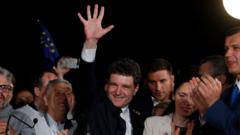Voters express anxiety about the future direction following the polarized elections between Nicusor Dan and George Simion.
**Nicusor Dan Elected Romanian President amid Nationwide Division**

**Nicusor Dan Elected Romanian President amid Nationwide Division**
Romania's new president faces immense challenges in a politically fragmented landscape.
In an unexpected twist in Romanian politics, voters have chosen mathematician Nicusor Dan as their new president, taking a stance against the entrenched political elite that has held power for over three decades. Dan, who emerged victorious from the recent elections, is often referred to affectionately as "Nicky." Following his win, he embraced familiar routines, promising his children that personal changes would be minimal despite the nation's significant upheaval.
Dan has served as the mayor of Bucharest since 2020 but remained relatively obscure outside the capital. His election is perceived not just as a quest for change but also as a backlash against far-right nationalism represented by his rival, George Simion, who garnered 41% of the vote in the initial round but fell to Dan in the subsequent runoff. Political analyst Radu Magdin noted, “This time, fear managed to defeat fury,” reflecting the sentiments of many voters motivated by a desire to prevent regressive policies.
While Simion had garnered support from individuals seeking a return to traditional values and a promise of delivering a better life through his "Romania first" agenda, his approach faltered amid controversial remarks and divisive rhetoric. Some voters expressed regret after his dismissive comments regarding the French government and maintenance of harmful stereotypes.
The push for Dan's victory has also been interpreted as an assertion of independence from Russian influence, especially in light of reported attempts by Russia to sway the electoral process. Celebrations marking Dan’s success symbolized a collective rejection of outside meddling, with crowds chanting, “Romania is not yours!” in reference to Moscow.
Ultimately, Dan's supporters not only wished to steer clear of nationalist polices but also rallied behind a vision of Romania firmly rooted within the European Union. The vibrancy of youth voters underscored desires to secure crucial EU funding and opportunities for growth.
Looking ahead, while Dan’s presidency has sparked hope among many, political analyst Radu Magdin cautions that the mainstream political class faces an uphill battle. “Next time, it’s ‘bye bye’ if these people do not do their job,” he warned regarding the prospects of the upcoming political climate. The looming threat of nationalist sentiment, as evidenced by Simion's continued influence, raises questions about the future trajectory of Romania's political landscape and its alignment with European values.
Dan has served as the mayor of Bucharest since 2020 but remained relatively obscure outside the capital. His election is perceived not just as a quest for change but also as a backlash against far-right nationalism represented by his rival, George Simion, who garnered 41% of the vote in the initial round but fell to Dan in the subsequent runoff. Political analyst Radu Magdin noted, “This time, fear managed to defeat fury,” reflecting the sentiments of many voters motivated by a desire to prevent regressive policies.
While Simion had garnered support from individuals seeking a return to traditional values and a promise of delivering a better life through his "Romania first" agenda, his approach faltered amid controversial remarks and divisive rhetoric. Some voters expressed regret after his dismissive comments regarding the French government and maintenance of harmful stereotypes.
The push for Dan's victory has also been interpreted as an assertion of independence from Russian influence, especially in light of reported attempts by Russia to sway the electoral process. Celebrations marking Dan’s success symbolized a collective rejection of outside meddling, with crowds chanting, “Romania is not yours!” in reference to Moscow.
Ultimately, Dan's supporters not only wished to steer clear of nationalist polices but also rallied behind a vision of Romania firmly rooted within the European Union. The vibrancy of youth voters underscored desires to secure crucial EU funding and opportunities for growth.
Looking ahead, while Dan’s presidency has sparked hope among many, political analyst Radu Magdin cautions that the mainstream political class faces an uphill battle. “Next time, it’s ‘bye bye’ if these people do not do their job,” he warned regarding the prospects of the upcoming political climate. The looming threat of nationalist sentiment, as evidenced by Simion's continued influence, raises questions about the future trajectory of Romania's political landscape and its alignment with European values.





















